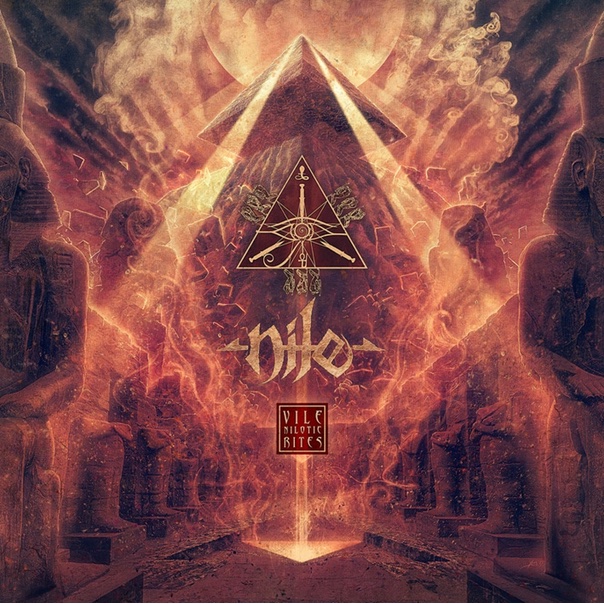ALBUM REVIEW: Nile starts a new death metal excavation on ‘Vile Nilotic Rites’
Nile has long distinguished itself with a unique concept. Guitarist, vocalist and principal songwriter Karl Sanders propelled the South Carolina band by infusing technical death metal with Egyptology and Lovecraftian horror. It’s served the band’s first eight albums well. But for Vile Nilotic Rites, Brian Kingsland replaced longtime guitarist Dallas Toler-Wade, and bassist Todd Ellis joined the band. This brought Nile to a crucial crossroads and the album demonstrated what this new lineup is capable of. Nile’s blinding speed, apocalyptic atmosphere and gargantuan heaviness is on full display, with more groove added for good measure.
Vile Nilotic Rites
Nile
Nuclear Blast Records, Nov. 1
It doesn’t take long for “Long Shadows of Dread” to prove Nile still has it. George Kollias’ unbelievably clean blast beats and double-bass percussion reinstate him as one of extreme metal’s best drummers. Kingsland and Ellis follow Sanders’ affinity for Middle-Eastern scales. Unlike a lot of modern technical death bands, Nile still writes memorable motifs. The blazing guitar solos come packed with tasty melodic ideas, and the low end remains as crushing as it is clear. In this way, the title track remains both brutal and anthemic. It even leaves room for Kollias to experiment with funky syncopation and for the guitarists to slow down their eviscerating riffs for a grand, cinematic vibe.
Nile still centers its brain-exploding shred-fests on the cosmic horror and ancient Eastern mythology, but Sanders lightens up on his lyrics this time around. Goofy titles like “Oxford Handbook of Savage Genocidal Warfare” and “Snake Pit Mating Frenzy” display this most obviously. Even so, the songwriting is still handled seriously. Both of these songs uncannily incorporate an arcane aura into bestial death metal. The acrobatic arpeggios and harmonic tremolo riffs still evoke ancient Egypt. The convincing vibe gets a visceral impact from beefy drumming and sludgy guitar tones.
The former’s breakneck tempo shifts and the latter’s short-but-deadly flurry feel intentional and personal. Even the layered vocals of Sanders, Kingsland and Ellis have a level of passion all but unheard-of from their contemporaries. It’s hard not to grimace—with glee—when those high screams and guttural lows cut in unison through the cyclopean barrage.
Ghostly acoustic guitars deepen the mood at the start of “The Imperishable Stars are Sickened,” but the emotional weight remains intact once the curb-stomping boot drops. The song’s preposterous heaviness in no way masks its expansive intent. How else could “Seven Horns of War” work the Godzilla theme and “The Caverns of Isengard” from Howard Shore’s Lord of the Rings score into its arrangement? The blaring low brass fits nicely with the detuned guitars, along with some well-placed choir vocals to contrast with abyssic growls and wretched screams. Nile’s natural bombast gives Vile Nilotic Rites an incredible sense of scope.
“Thus Sayeth the Parasites of the Mind” provides the album’s customary foray into traditional Middle-Eastern folk music. The interlude’s authentic use of sitar, hand percussion, ceremonial chants—and presumably Sanders’ handmade Turkish bağlama saz—recurs throughout the album. The flamenco guitar-driven dance passage on “Where is the Wrathful Sky” is a more obvious example, but even a more bludgeoning cut like “That Which is Forbidden” feeds into that same primeval wellspring. Nile treats Middle-Eastern folk melodies and ceremonial ambiance as the essence of its music, from the ferocious exterior to the terrifying core.
It takes special players to keep deep cuts like “Revel in Their Suffering” from getting lost in the technical death metal whirlwind. The song’s seamless incorporation of orchestral grandiosity, mind-blowing dexterity and powerful melody remains satisfying. The same is true of closer “We Are Cursed.” Bookended by ominous textures, each groove hits like a rocket-propelled bull, while each rapid-fire onslaught pierces like a salvo of arrows. Kollias always adds extra flourishes to the rhythm structure, and the guitars always strike a balance between taste and precision.
On its ninth album, Nile sounds more vital than ever. The chemistry between Sanders and Kollias has rubbed off on the newer additions, making for a glorious reentry to the death metal vanguard. Vile Nilotic Rites lives up to its potential as a new beginning.
Follow editor Max Heilman at Twitter.com/madmaxx1995 and Instagram.com/maxlikessound.

